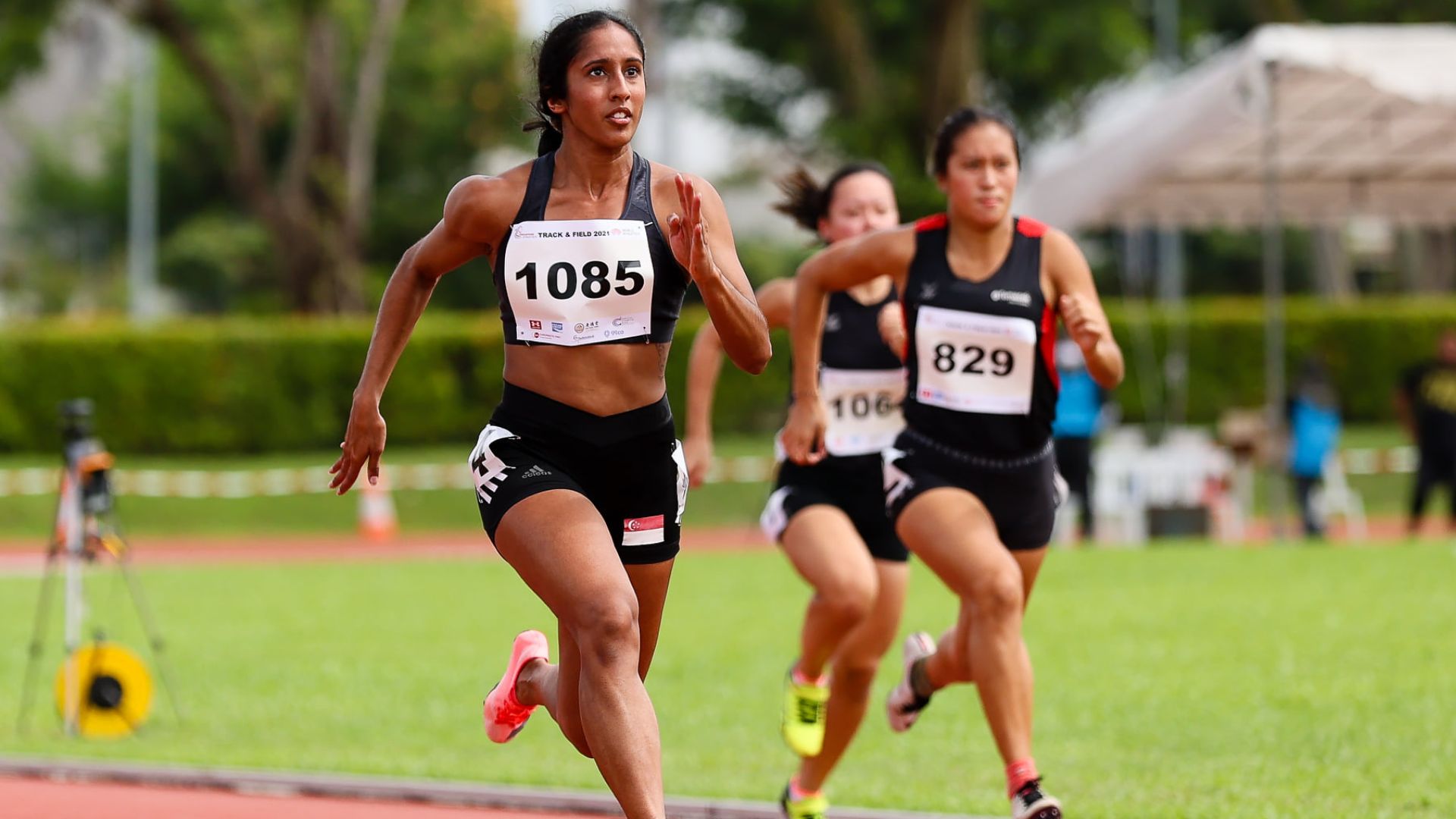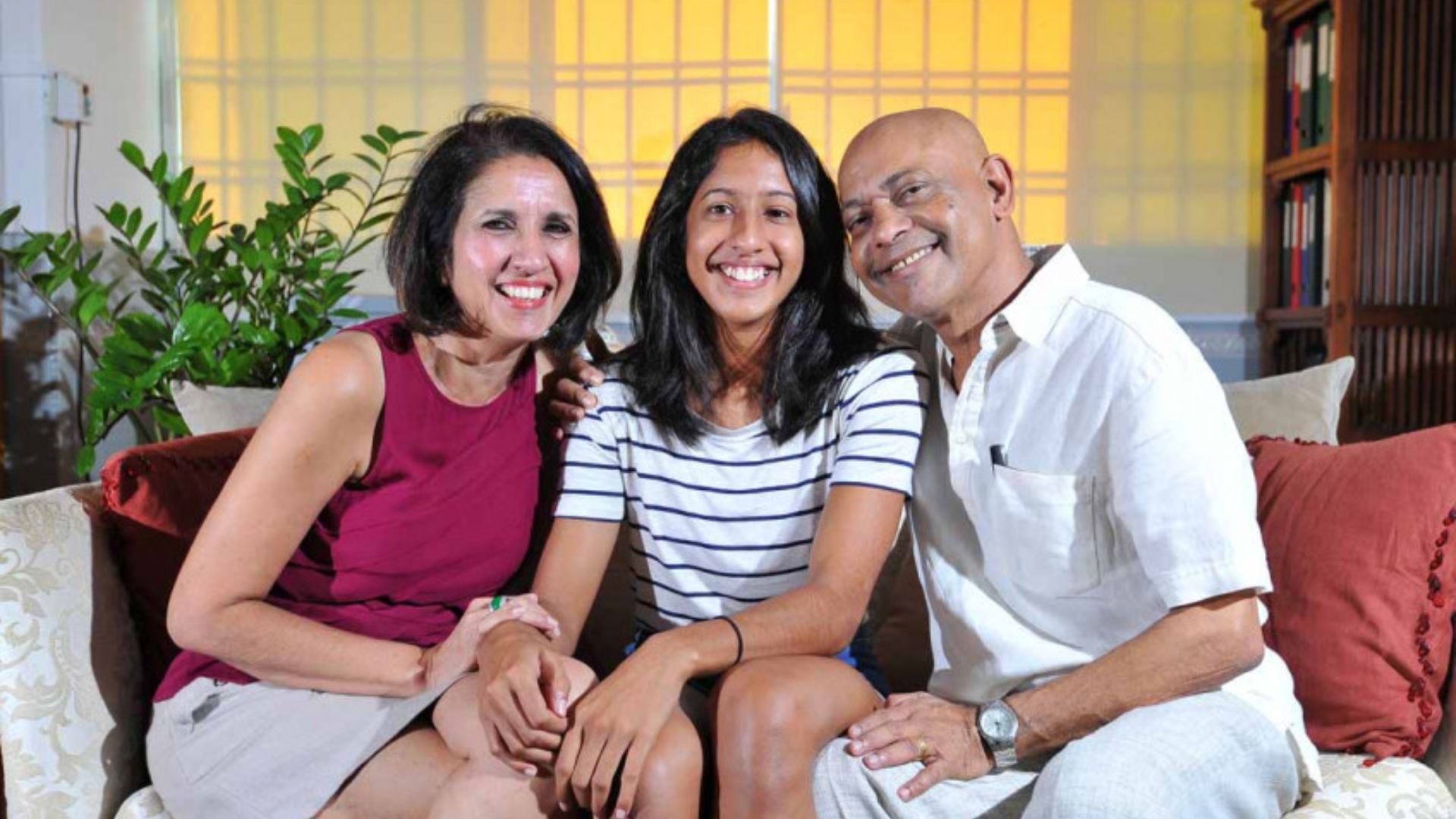For Singapore sprint queen Shanti Pereira, her passion for gold and her need for speed are one and the same. Together, they will get her to the tape at the finishing line – Paris 2024.
The 25-year-old showed her mettle at the recent Commonwealth Games in Birmingham when she not only set a new national record in the 100m heats when she clocked 11.48s, she also set a second new national record, this time in the 200m heats with a time of 23.46s. Both events, she qualified for the semi-finals.
Unfortunately she did not make the finals for both events.
“I’ve run a lot of races in my life, but I have few highlights. One of them would be when I broke the national record for the first time. It wasn’t mine but somebody else’s that I was aiming for. Until today, that’s probably one of the biggest highlights of my track career. Even though I’m running faster than that time now, the whole moment was crazy,” she tells TheHomeGround Asia.
Shanti was then competing in the heats at the 8th IAAF World Youth Championships in Donetsk, Ukraine in 2013, finishing second and qualified for the semi-finals, despite having the third-slowest reaction time and also running into a headwind of 1.0 metres per second.
Shanti clocked a time of 11.89s, breaking Amanda Choo’s national mark of 12.01s and becoming the first Singaporean woman to run below 12 seconds in the 100m sprint.
She was only 16.

“My goal then was to just try and make it past one round, so I don’t only run once, but twice. That was my goal. That year, I was doing pretty well timing wise, but I never went anywhere close to breaking the 12s mark. I didn’t come close to it,” she says.
Recalling that moment, Shanti says, “I just went into the race, like any other race, focusing on what I had to do. … The funny thing was when I finished my race, I knew that I came in second, but I didn’t know my time. They usually flash it on the screen but this time they didn’t because something went wrong. It was not until I went back to the rest of my team that they congratulated me. I thought it was for making the semis but they responded with, ‘No, you just broke the national record’. I was shocked. I was stunned.”
It was midnight in Singapore but she was too excited to care and called her parents. “Even until now I can’t believe that happened,” she adds.
The family that sprints together
The youngest of four siblings, Shanti could not remember a time when she was not running.
“The whole family runs or used to,” she says.

Her parents – father Clarence Pereira, 65, and mother Jeet Pereira, 61 – used to run for their respective schools. Even her older sister Valerie was a national sprinter.
Shanti, who hero-worshipped her sister, wanted to follow closely in her footsteps. It included going to the Singapore Sports School (SSP) instead of to CHIJ Katong Convent, where her father wanted her to “because my sister went there”. She wanted to share her experience in terms of competing and training, and to continue her sport.
“We always supported Valerie at her competitions and that made me want to take up the sport. When I was nine I took part in the 100m race and after winning I was asked to join the track-and-field team,” she says.
Unfortunately, as a Secondary 1 student in 2009, Shanti made headline news when she anchored the 4x400m relay team to a gold medal on the last day of the National Inter-School Track and Field Championship. Just 12 years old, she was a member of the under-14 team to the chagrin of the older students. She was ostracised and bullied.
Yet like a phoenix, Shanti rose above the fray to become Singapore’s sprint queen.
Shanti claimed Singapore’s first sprint gold medal since the last one 42 years ago when she won the 200 metres in a national record on home soil at the 2015 SEA Games. Then 18, Shanti clocked 23.60s in front of a raucous crowd at the National Stadium to take the title and rewrite the national record. She became the first woman since Glory Barnabas at the 1973 SEAP Games to win a sprint gold for Team Singapore.
Her appearance at the Tokyo Olympics in 2021 also marked a significant milestone not only for Shanti herself but also for the sports in Singapore. It was 69 years when Tang Pui Wah, the first Singaporean woman, competed in the 200m event in Helsinki in 1952.
The next two female sprinters from Singapore were Mary Klass and Janet Jesudason when they ran in Melbourne at the 1956 Olympic Games. Klass clocked a time of 12.6 seconds in her heat, while Janet managed 13.2 seconds.
Heavy sits the head that wears the crown
Since then, no other Singaporean woman qualified for the Olympic Games in the short-sprint distance until Shanti.
“Now, when I look back and think about it, I definitely had a lot of pressure on me. But it is only now that I realise it’s just what comes with the job – pressure, especially if you achieve that kind of status. It’s another ‘like that lor’ moment and it comes with the territory. Then, I wasn’t mentally prepared so I felt I had to perform at every race,” she says.
Shanti admits that she has her ups and downs. “Even in training, not every single day is going to be great. I have good weeks and I have bad weeks, I have good days and bad days. It’s so erratic and it’s never a line that just constantly goes up. I think I didn’t grasp that concept well enough back then. So it really hit me hard when I couldn’t uphold the golden girl status, when I couldn’t win the gold again,” she says.
To Shanti, the pressure just kept building. “It really took quite a toll on me, which is why my season this year was even more meaningful to me, because it took so much for me to get to this place. Even now I’m not perfect, but I’m still growing and learning. I made a lot of breakthroughs that I didn’t think I could in the past few years. I thought my capacity was full, but I proved myself wrong. Together with the personal best and national records that I achieved this season, that’s also a goal that I managed to achieve which means a lot to me,” she adds.
Citing Jamaican Olympic sprinter Usain Bolt, who is widely considered as the greatest sprinter of all times, Shanti says, “People don’t realise how amazing he actually is because he managed to win gold at an Olympic Games three times in a row. Do you know how hard that is? It is so freaking hard, but he did it. Yet along the way, he had his troubles also. He wasn’t peaking, there were people beating him and there were so many people talking about him, saying maybe he can’t do it anymore.”

“I keep track of global athletics and there’s always big meets happening every other month. I keep track to see how all these world class athletes are competing and I realised that even they are not always at their peak. My boyfriend and I have this habit of watching YouTube races and YouTube has links to other races, which keeps going on. So we watched Usain Bolt’s races. I then realised that even he isn’t at his best all the time,” she adds.
The Singapore Management University (SMU) alumna, who works as a fashion content creator also expresses her gratitude to her boss, who is herself an influencer, for being understanding when it comes to time taken from work for her training and competitions.
After Shanti’s first Games gold, her older sisters Valerie and Shobi even wrote a children’s book, titled Go Shanti! Go to tell the story of her journey and triumph. It was published in 2020 and aimed to inspire the next generation of sporting heroes.
To the future sprint queens of Singapore, Shanti has this to say, “Don’t be afraid to pick up something that is out of the ordinary even if Singapore’s landscape is a bit daunting. Just continue growing into it because ultimately it is your journey. If there’s anyone that can determine how it turns out, it is you.”
RELATED: Passion for gold: National para swimmer Toh Wei Soong creates waves
Join the conversations on TheHomeGround Asia’s Facebook and Instagram, and get the latest updates via Telegram.














